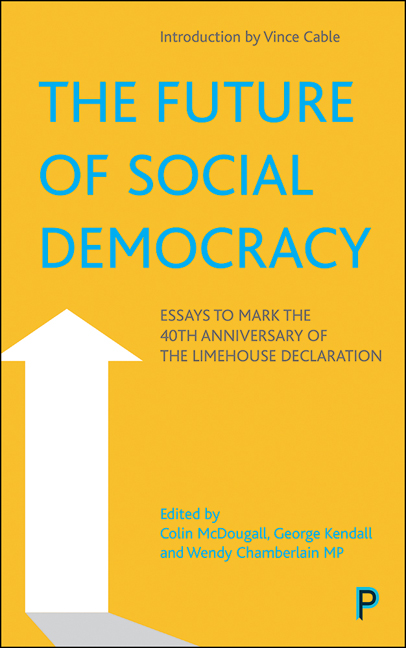Book contents
- Frontmatter
- Dedication
- Contents
- Notes on the authors
- Foreword
- Introduction: what are the priorities for social democrats?
- One After the failed alternative vote referendum, how can electoral reform have a future?
- Two How could a government actually deliver more housing?
- Three How will technology change the future of work?
- Four Can better public ownership promote efficiency and social justice?
- Five How do we grow the economy without damaging the environment?
- Six How can global free trade work for everyone?
- Seven Towards a social democratic foreign policy?
- Eight How do we deliver social justice through education?
- Nine What is the Social Democrat Group?
- Index
Six - How can global free trade work for everyone?
Published online by Cambridge University Press: 05 January 2022
- Frontmatter
- Dedication
- Contents
- Notes on the authors
- Foreword
- Introduction: what are the priorities for social democrats?
- One After the failed alternative vote referendum, how can electoral reform have a future?
- Two How could a government actually deliver more housing?
- Three How will technology change the future of work?
- Four Can better public ownership promote efficiency and social justice?
- Five How do we grow the economy without damaging the environment?
- Six How can global free trade work for everyone?
- Seven Towards a social democratic foreign policy?
- Eight How do we deliver social justice through education?
- Nine What is the Social Democrat Group?
- Index
Summary
Whatever else liberals and social democrats believe in, we believe in free trade. Free trade is more than just a tariff schedule or a list of commodity codes; it is a belief that individuals are more important than the state. It enables individuals to form economic relationships with each other, to transcend the restrictions of their background and nationalities, and to contribute what is best about themselves to the wider world. It enriches both sides – joining up demand with supply across national and geographic boundaries.
Free trade breaks down when national governments impose themselves between purchasers and suppliers, and demand some of the value of the transaction for themselves. It breaks down when established players in a domestic market use their greater leverage to protect their position against possible competitors. The forces undermining free trade – nationalism and vested interests – are precisely those that Liberal Democrats seek to combat.
So, it is no surprise that the pulse of liberalism first quickened to the issue of free trade. It is the founding narrative, the origin myth, the raison d’être and the rallying call around which the aristocratic Whigs, the Peelite Tories and the anti-Corn Law League Radicals united to form the Liberal Party, in opposition to the Tory Party of tariff reform and imperial preference.
The repeal of the Corn Laws represented a great strategic shift in UK economic policy. For the first time, cheaper prices for wage-earners were prioritised over higher prices for landowners, aurban dwellers were favoured over rural and manufacturing was prioritised over agriculture. The consequence of cheaper food prices for the majority of the population meant greater disposable income, which, in turn, led to increased demand for manufactured goods. This boost to our domestic economy financed the huge leap forward in technology that Britain experienced in the second half of the 19th century, in terms of railways, motor cars, telephony and electrical power. Also, the increased status of ordinary working people was recognised by the gradual extensions to the voting franchise over the next 75 years. The contribution of working people to the wealth of the nation gave birth to the first social democratic movements – employers found it in their interests to provide decent housing and healthcare to their workers, and workers organised their own education and welfare systems.
- Type
- Chapter
- Information
- The Future of Social DemocracyEssays to Mark the 40th Anniversary of the Limehouse Declaration, pp. 83 - 92Publisher: Bristol University PressPrint publication year: 2021

